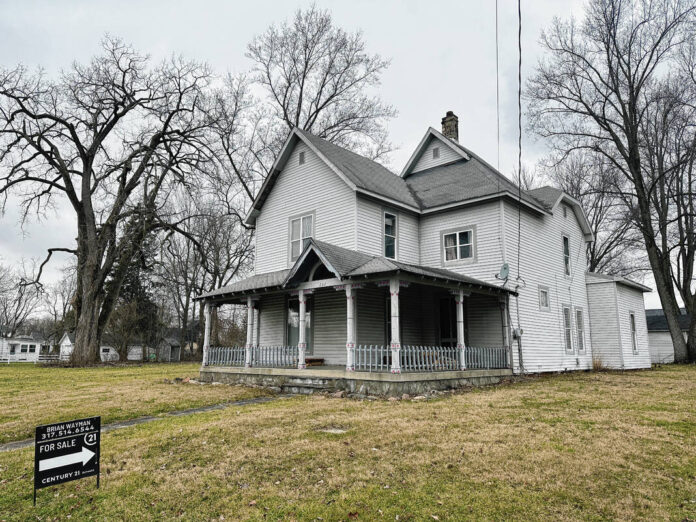GREENFIELD – Planning authorities denied a request to split a residential land parcel into four lots, thwarting the property owner’s goal of adding three houses next to a home with local historical significance.
The decision came amid concerns over the effect the new houses would have on one of Greenfield’s oldest neighborhoods.
McCordsville-based Avalon Management Group I, LLC, which owns the property at 222 Douglas St. in Greenfield, and applicant Suto Investments LLC sought the re-plat of the land, which is about ⅘ of an acre and contains an unoccupied house built in the 1880s. The firms asked the Greenfield Plan Commission to approve dividing the property into four lots. The lot with the existing home would have been nearly 72 feet wide while the three to its west would have been 45 feet wide. A majority of plan commission members voted against the request, however.

David Short of Avalon Management Group I, who identified himself as a house flipper, noted the home on the property is for sale but that he would see to its renovation if it is not sold. He added builders would develop single-family homes on the other three lots ranging from $350,000 to $400,000 and likely be two stories tall. Short said the houses wouldn’t be built as rental properties but acknowledged he could not control if future owners leased them.
Several residents who live near the property spoke against the proposal at the plan commission meeting. They raised concerns that the endeavor would not fit in with the neighborhood and called for more research to be conducted into the property to determine its historical significance. They also expressed concerns over the property’s old mulberry tree, which Short said would likely have to be removed ahead of development.
Bailey Bach said she and her husband moved into a nearby home in the neighborhood a little over two years ago and that they were drawn by its “old house charm.” She added that their house had stood empty in various stages of demolition for years before a previous owner fixed it up, and that since then several other homes in the neighborhood have also been remodeled. Many homes in the neighborhood remain empty, she continued.
“I do not see the purpose of cutting up an existing property and building more homes when we have homes with good bones that need to be fixed up before we build more homes,” Bach said. “We are seeing a huge economic downturn, we are seeing days on market increase, we are seeing prices decrease. I think it’s unrealistic to think that we’re going to put more homes in a neighborhood that already has empty homes and see them filled. I don’t want our neighborhood to be half empty again like it was after the last economic downturn.”
Center Township Trustee Thomas Lopez and Joe Skvarenina, Hancock County historian, sent letters to the plan commission expressing their opposition to the proposal.
Skvarenina said the house on the property had 16 different kinds of wood inlaid in the dining room floor and featured details like acid carvings in its door hinges. The property also had a barn that had been turned into an art studio, his letter continued. He recalled that the house was once home to Thomas Black, whose family had ties to famed poet and Greenfield native James Whitcomb Riley.
“The Black house is a cultural treasure,” Skvarenina said in his letter. “Anything done to diminish its grandeur by building … houses on the property would be very unwise.”
Lopez wrote in his letter that he lives near the house and that generations of his family have lived in and owned homes nearby as well. He shared fond memories of Black, said other parts of the city were better suited for building new homes and expressed concerns over the kinds of houses that would go there, especially if they were rentals.
“It would be a shame to eliminate one of the last few properties left in the city that offers this lot size,” Lopez said in his letter. “Greenfield is filled with old charm. We do not want to see such a vast, beautiful property be broken down into multiple lots.”
If the re-plat was approved, a next step would have been to submit plans that city planning department staff would have reviewed to ensure proposed houses met local architectural standards.
Greenfield planning director Joanie Fitzwater and city senior planner Evan Beaty recommended approval of Short’s request, noting property owners have the legal right to subdivide their land if it meets the local zoning code.
“Part of me says we need housing, we need all kinds of housing, and to have available lots with water and sewer and sidewalks already available – it’s kind of a travesty to not provide additional housing,” Fitzwater said. “We could only have a request of the petitioner to go above and beyond our architectural standards – try and develop a home that fits into the fabric of this neighborhood.”
Beaty, noting the city development ordinance’s heritage-based approach, asked if Short would commit to having houses built with detached garages like other homes in the area. Short said it would be possible if garages were located behind the houses, but would require shared driveways. Rear detached garages would be preferable, he continued, adding it would allow for floor plan possibilities similar to those existing in the neighborhood. But, as a house flipper and not a builder, Short said it would ultimately be up to whoever builds on the lots.
Mike Terry, a Greenfield Plan Commission member, moved to approve the re-plat, but his motion died for lack of a second. Plan commission member Paulette Richardson later moved to deny the re-plat, with her, Becky Riley, David Spencer and Kristi Baker voting in favor of the denial and Terry and Jason Koch voting against. Chris Cooper recused himself from the discussion and vote because his firm, Coor Consulting & Land Services, worked with Short on the proposal. Jeff McClarnon was absent.
Spencer said he felt conflicted about the decision and recognized Short has the right to divide his property.
“But at the same time, I think when you’re looking at the charm of the neighborhood, … we need to make sure that the right houses are put in that neighborhood.”
Short told the Daily Reporter he thinks the plan commission made the wrong decision.
“Sometimes you have stuff don’t go your way, and I really didn’t think I got a fair shake,” he said, recalling the planning department staff’s support despite the commission’s denial. “…I would’ve made this place significantly better than it was.”
He added he doesn’t know if he’ll pursue legal action in an attempt to get the approval he sought.
“My nature – I’m not litigious, but on the same token they put me in a position where I have a piece of property now I’m probably going to lose money on, and if somebody did want to pursue it they certainly would have a shot to win the case,” he said. “…I may try to change my plot a little bit and go back, I don’t really know.”





